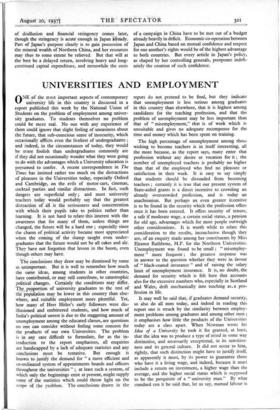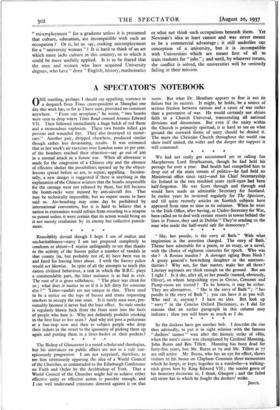UNIVERSITIES AND EMPLOYMENT
ONE of the most important aspects of contemporary university life in this country is discussed in a report published this week by the National Union of Students on the problem of employment among univer- sity graduates. To students themselves no problem could be more real. No one with any experience of them could ignore that slight feeling of uneasiness about the future, that sub-conscious sense of insecurity, which occasionally afflicts even the liveliest of undergraduates ; and indeed, in the circumstances of today, they would be more foolish than undergraduates commonly are if they did not occasionally wonder what they were going to do with the advantages which a University education is presumed to confer. A recent correspondence in The Times has insisted rather too much on the distractions of pleasure in the Universities today, especially Oxford and Cambridge, on the evils of motor-cars, cinemas, cocktail parties and similar distractions. In fact, such dangers are superficial only ; and most university teachers today would probably say that the greatest distraction of all is the seriousness and concentration with which their pupils take to politics rather than learning. It is not hard to relate this interest with the awareness that for many of them, unless things are changed, the future will be a hard one ; especially since the charm of political activity became most appreciated when the coming of the slump taught even under- graduates that the future would not be all cakes and ale. They have not forgotten that lesson in the boom, even though others may have.
The conclusions they draw may be dismissed by some as unimportant. But it is well to remember how much the same ideas, among students in other countries, have contributed, or may still contribute, to catastrophic political changes. Certainly the conditions may differ. The„ptoportion of university graduates to the rest of the population may. be lower in this country than else- where, and suitable employment more plentiful. Yet, how many of Herr Hitler's early followers were dis- illusioned and embittered students, and how much of India's political unrest is due to the staggering amount of unemployment among the educated classes, are questions no one can consider without feeling some concern for the products of our own Universities. The problem is in any case difficult to formulate, for as the in- troduction to the report emphasises, all enquiries are handicapped by a lack of adequate statistics and any conclusions must be tentative. But enough is known to justify the demand for " a more efficient and co-ordinated system of appointments boards and officers throughout the universities " ; at least such a system, of which only the beginnings exist at present, might supply some of the statistics which could throw light on the scope of the problem. The conclusions drawn in the report do not pretend to be final, but they indicate that unemployment is less serious among graduates in this country than elsewhere, that it is highest among candidates for the teaching profession, and that the problem of unemployment may be less important than that of " misemployment," that is of work which is unsuitable and gives no adequate recompense for the time and money which has been spent on training.
The high percentage of unemployment among those wishing to become teachers is in itself interesting, all the more because, as the report says, many enter that profession without any desire or vocation for it ; the number of unemployed teachers is probably no higher than that of the employed who fmd no pleasure or satisfaction in their work. It is easy to say simply that students should be dissuaded from becoming teachers ; certainly it is true that our present system of State-aided grants is a direct incentive to crowding an already overcrowded profession, and is today an anachronism. But perhaps an even greater incentive is to be found in the security which the profession offers once it has been entered. It offers security of tenure, a safe if moderate wage, a certain social status, a pension for old age, advantages which for most people outweigh other considerations. It is worth while to relate this consideration to the results, inconclusive though they are, of an enquiry made among her constituents by Miss Eleanor Rathbone, M.P. for the Northern Universities. Unemployment was found to be small ; " misemploy- ment " more frequent ; the greatest response was in answer to the question whether they were in favour of " black-coated insurance " and of raising the salary limit of unemployment insurance. It is, no doubt, the demand for security which is felt here that accounts also for the excessive numbers who, especially in Scotland and Wales, drift mechanically into teaching as. a pro- fession in life.
It may well be said that, if graduates demand security, so also do all men today, and indeed in reading this report one is struck by the similarity between employ- ment problems among graduates and among other men ; it emphasises how little the products of the Universities today are a class apart. When Newman wrote his Idea of a University he took it for granted, at least, that the idea was to produce a type of mind in some way distinctive, and necessarily exceptional, in its sensitive- ness and its general culture. It did not occur to him, rightly, that such distinction might have to justify itself, as apparently it must, by its power to guarantee those who have it a living wage, and indeed, because it must include a return on investment, a higher wage than the average, and the higher social status which is supposed to be the perquisite of a " university man." By what standard can it be said that, let us say, manual labour is " misemployment " for a graduate unless it is presumed that culture, education, are incompatible with such an occupation ? Or is, let us say, cooking misemployment for a " university woman " ? It is hard to think of an art which more lacks culture in this country, or to which it could be more usefully applied. It is to be feared that the men and women who have acquired University degrees, who have " done " English, history, mathematics or what not think such occupations beneath them. Yet Newman's idea at least cannot and was never meant to be a commercial advantage ; it still underlies our conception of a university, but it is incompatible with Universities which are meant first of all to train students for " jobs " ; and until, by whatever means, the conflict is solved, the universities will be seriously failing in their mission.







































 Previous page
Previous page